
ICAS Bulletin (online ISSN 2836-3418, print ISSN 2836-340X) is published every other week throughout the year at 1919 M St NW, Suite 310, Washington, DC 20036.
The online version of ICAS Bulletin can be found at chinaus-icas.org/bulletins/.
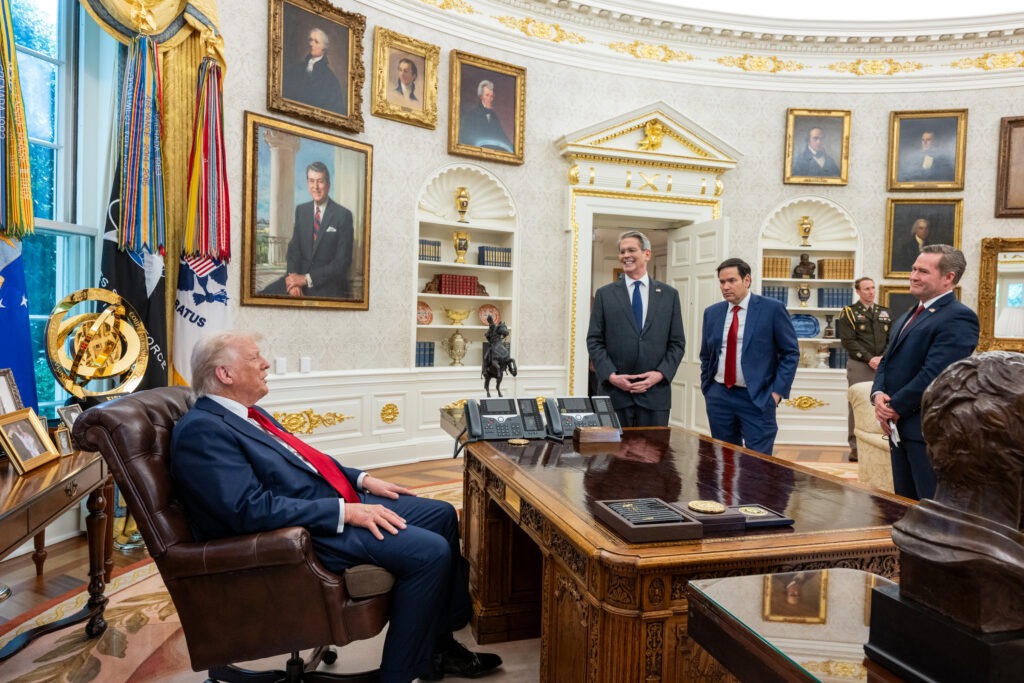
–Despite weeks of harsh criticism and demands from President Trump that the Fed reduce borrowing costs, the Fed will likely keep its key short-term interest rate unchanged on May 7’s board meeting.
– A stampede of U.S. companies, including McDonald’s General Motors and Delta Airlines have warned of big hits to earnings as higher import levies raise costs and deter spending.
– Apple CEO Tim Cook warned that Trump’s 145% tariffs on China could cost the company $900 million this quarter, prompting Apple to accelerate shifting iPhone production from China to India and diversify its supply chain.
– On May 1, Treasury Secretary Scott Bessent suggested the Federal Reserve should consider cutting interest rates—amid concerns that Trump’s escalating tariffs may weaken the U.S. economy more than inflation pressures.
– Goldman Sachs CEO David Solomon warned of the uncertainty caused by Trump’s tariff policies and expected that there could be more economic pain ahead.
– On April 30, Senate Republicans narrowly voted down a Democratic resolution that would have blocked global tariffs announced by the Trump administration.
– Twelve more states are suing the Trump administration over what they call its illegal tariffs, asking the U.S. Court of International Trade to halt the levies immediately.
Associated News References:
“Despite Trump’s pressure, Federal Reserve likely to keep rates unchanged this week,” PBS, May 5
“Fed policymakers expected to keep rates steady as tariffs roil outlook,” Reuters, May 5
“Trump’s tariffs could cost Apple $900 million this quarter, CEO Tim Cook says,” CNN Business, May 2
“Bessent Says Markets Think Fed Should Cut Rates,” The Wall Street Journal, May 1
“Goldman Sachs’ CEO Talks Policy Uncertainty, Tariffs,” Bloomberg, April 30
“The Senate votes down resolution to block Trump’s global tariffs amid economic turmoil,” AP News, April 30
“12 States Sue Over Trump Tariffs, Asking Trade Court to Halt Them,” Barron’s, April 24
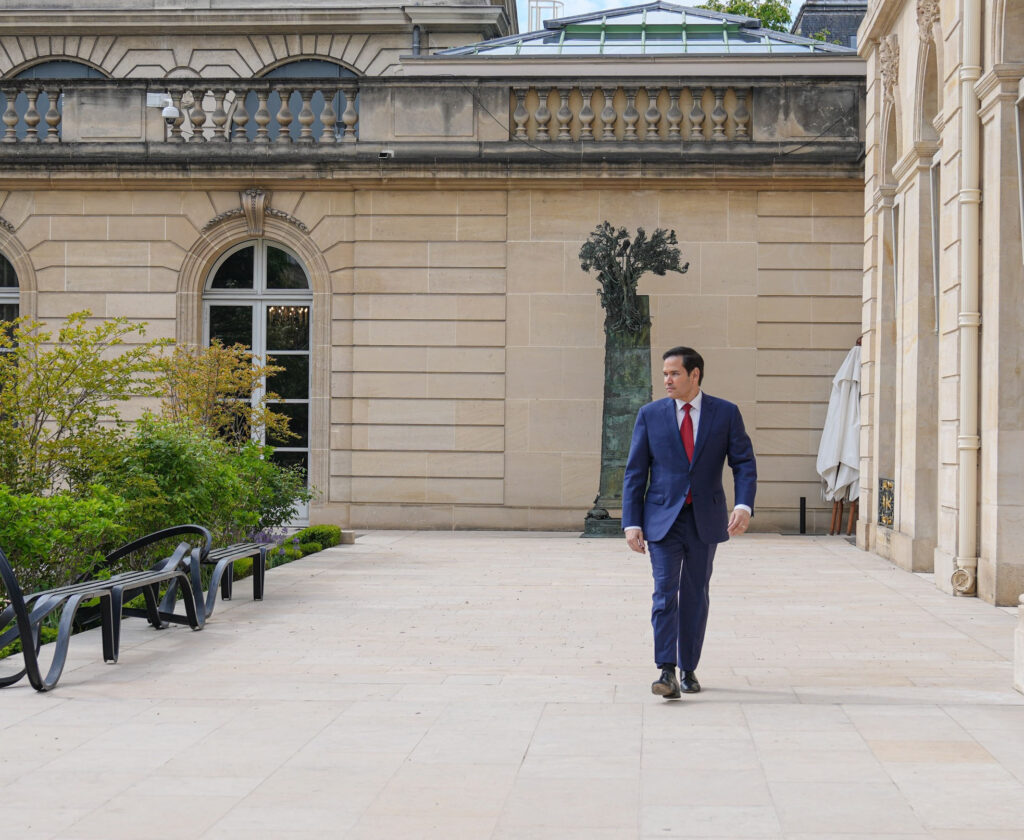
– The CIA is making an intensified public push to boost human intelligence gathering on the U.S.’s strategic rival as the Langley-based agency recently released two Chinese language videos to encourage Chinese officials to leak secrets to the U.S.
– On May 1, President Trump ousted National Security Adviser Mike Walt and named Secretary of State Marco Rubio as interim replacement.
– On April 29, the Senate confirmed former Georgia Senator David Perdue as U.S. ambassador to China, positioning the Trump ally and China hawk to navigate escalating tensions over tariffs, military rivalry, and fentanyl exports.
– Turmoil surrounding Defense Secretary Pete Hegseth deepened after revelations he sought to brief Elon Musk on classified China-related war plans without proper clearance, raising concerns about national security and dysfunction at the Pentagon.
– On April 22, Secretary of State Mark Rubio unveiled a State Department overhaul cutting democracy and human rights offices while adding a bureau for AI and cyber threats to deal with expanding Chinese influence.
Associated News References:
“New CIA videos aim to lure Chinese officials,” Reuters, May 1
“Trump Moves Waltz to U.N. and Names Rubio Interim National Security Adviser,” The New York Times, May 1
“Senate confirms David Perdue as Trump’s ambassador to China,” Politico, April 29
“Trump unlikely to dismiss Hegseth, but officials are troubled by disarray in Pentagon chief’s inner circle,” CNN Politics, April 23
“Rubio unveils sweeping reorganization of State Department,” The Washington Post, April 22
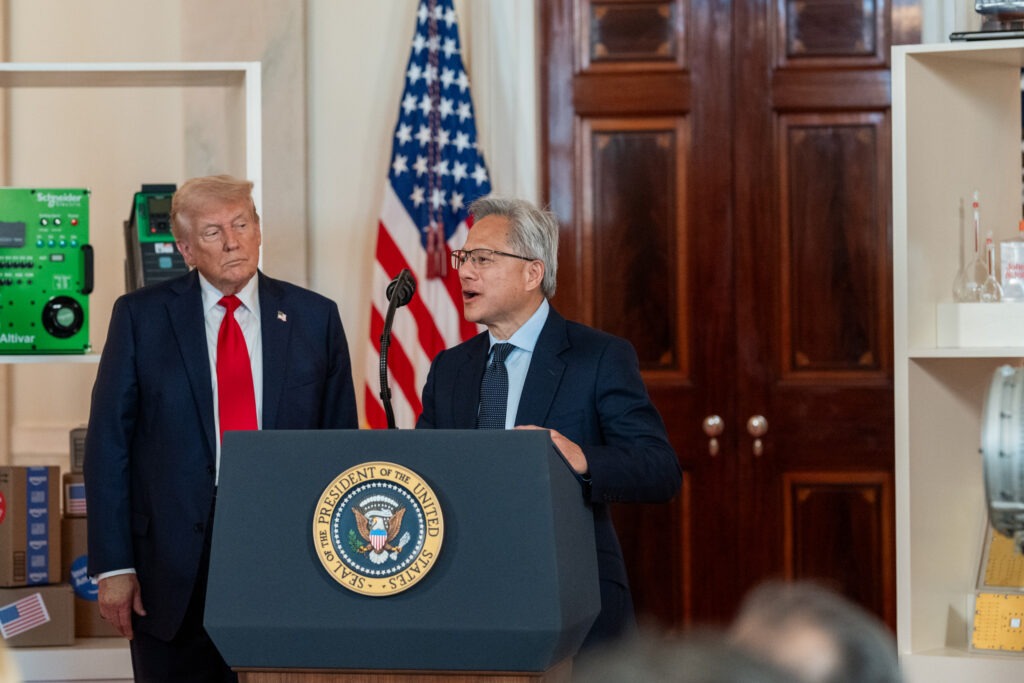
– After weeks of escalating tensions and impasse, China announced that it will send economic tsar He Lifeng to meet with U.S. Treasury Secretary Scott Bessent and USTR Jamieson Greer in Switzerland on May 10 for talks.
– On May 6, Secretary of Treasury Scott Bessent said that the trade negotiation with China over tariffs has not begun.
– On May 4 night, President Trump threatened to impose 100% tariffs on “any and all Movies” coming into the U.S. that are produced in “Foreign Lands” in a social media post.
– Temu, a low-cost retailer based in China, has overhauled its business model by halting shipments of Chinese-made goods to customers in the U.S. following the termination of de minimis tariff exemption.
– A U.S. lawmaker plans to introduce legislation in coming weeks to verify the location of artificial-intelligence chips like those made by Nvidia after they are sold in order to block the chip tycoon from selling to China.
– On May 2, the Trump administration officially ended the de minimis tariff exemption for Chinese goods, claiming to protect U.S. manufacturers, but experts are concerned about rising prices and disruptions for American small businesses.
– Beijing announced it is evaluating a U.S. offer for trade talks regarding President Trump’s 145% tariffs, signaling a possible easing of the ongoing trade war.
– Nvidia reportedly informed major Chinese clients like Alibaba, ByteDance, and Tencent that it is redesigning its AI chips to comply with U.S. export rules while maintaining sales to China.
– On April 29, China’s Foreign Ministry released a defiant video vowing never to “kneel down” to U.S. trade bullying, urging global resistance to U.S. hegemony and signaling Beijing’s unwillingness to make concessions under coercion.
Associated News References:
“US, China to hold ice-breaker trade talks in Geneva on Saturday,” Reuters, May 7
“Trade Talks With China Have Not Started, Bessent Says,” The New York Times, May 6
“Trump threatens a 100% tariff on foreign-made films, saying the movie industry in the US is dying” AP News, May 5
“Temu halts China shipments to U.S. as de minimis tariff exemption ends” CBS News, May 5
“Exclusive: US lawmaker targets Nvidia chip smuggling to China with new bill,” Reuters, May 5
“Trump ends Chinese tariff loophole, raising the cost of online goods,” The New York Times, May 2
“Nvidia is working on China-tailored chips again after US export ban, The Information reports,” Reuters, May 2
“China ‘evaluating’ US offer to negotiate tariffs; Beijing’s door is ‘open’,” Reuters, May 2
“In Vivid Video, Beijing Vows Not to ‘Kneel Down’ to Washington,” The Wall Street Journal, April 29
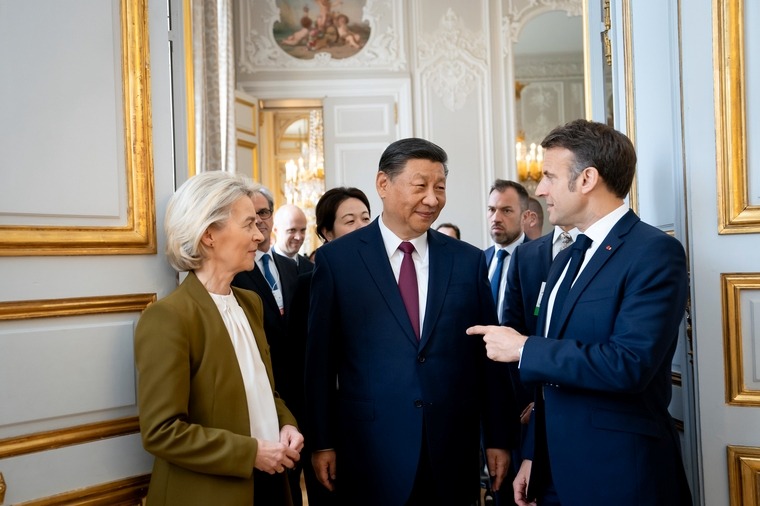
–The European Union plans to hit about 100 billion euros ($113 billion) in U.S. goods with additional tariffs in the event ongoing trade talks fail.
– The European Union will not decouple from the Chinese economy as a condition for reaching a trade deal with Donald Trump’s administration, the European Commission said on May 6 amid reports that the White House has asked countries to do exactly that.
– EU trade negotiator says U.S. could collect over $100 billion from EU via new tariffs on goods like pharmaceuticals and semiconductors.
– China’s President Xi Jinping has called on European Union leaders to stand with it against unilateralism, in a veiled rebuke to U.S. President Donald Trump’s efforts to upend the global world order.
– The EU’s attempt to stop China from buying out its top chipmakers and AI companies is being hallowed out from within.
– TikTok was fined 530 million euros ($600 million)by the Irish Data Protection Commission on May 2 for violating a European Union data privacy law.
– The U.S. has openly criticized China, India, and the EU for “unfair trade practices” that allegedly harm America’s domestic textiles and apparel sector, according to a USTR statement published on May 3.
– China lifted sanctions on several EU lawmakers and the European Parliament’s Human Rights Subcommittee in a bid to improve ties with Europe amid rising pressure from Trump’s sweeping trade tariffs targeting both China and the EU.
Associated News References:
“EU Eyes €100 Billion of US Goods With Tariffs If Talks Fail,” Bloomberg, May 6
“EU won’t decouple from China as condition for reaching trade deal with Trump,” euronews, May 6
“U.S. Could Collect More Than $100 Billion With Broader Tariffs, EU Trade Official Says,” The Wall Street Journal, May 6
“Xi Urges EU to Join Forces Against Unilateralism in Swipe at US,” Bloomberg, May 6
“EU countries soften push to stop Chinese tech buyouts,” POLITICO, May 6
“US Accuses China, India, EU of Unfair Trade Practices as Textile Industry Faces Major Job Losses,” Times Now, May 3
“TikTok Fined $600 Million for Sending European User Data to China,” The New York Times, May 2
“China ends sanctions on EU lawmakers as pressure grows over US trade war,” RFI, May 1
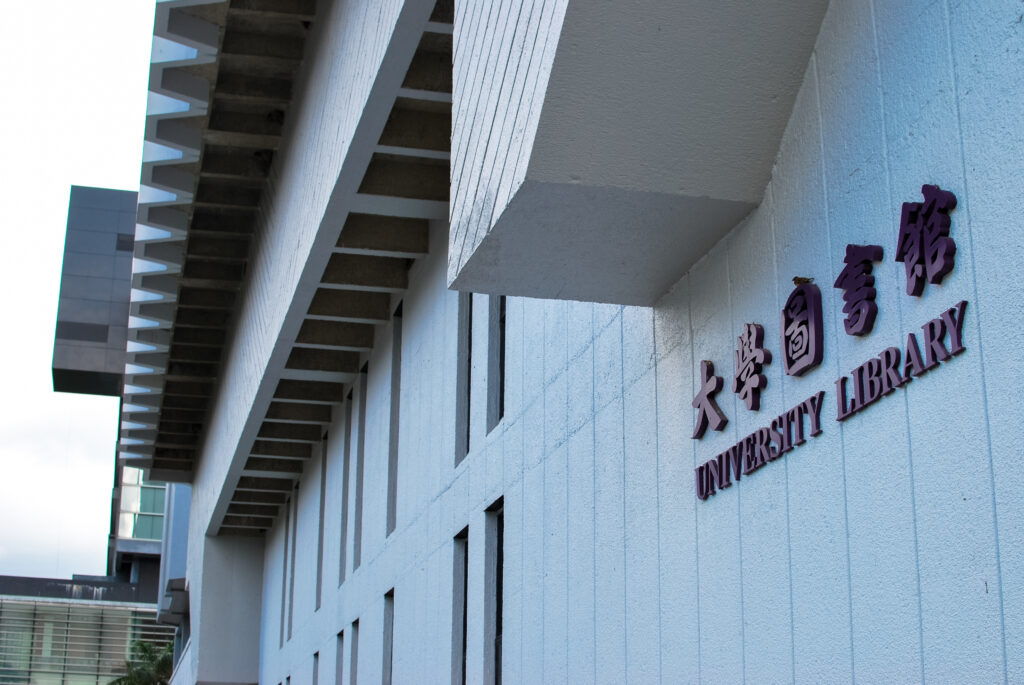
–European leaders have called the Trump administration’s research funding cuts and targeting of elite universities a “gigantic miscalculation,” aiming to seize the moment to attract U.S.-based scientists to Europe.
– Chinese scientists in the U.S. are facing growing scrutiny, exemplified by the FBI raid of cybersecurity expert Xiaofeng Wang from Indiana University over suspected ties to China, despite no criminal charges being filed.
– President Trump announced plans to revoke Harvard’s tax-exempt status after the university sued his administration over a $2.2 billion funding freeze tied to disputes over campus antisemitism, escalating tensions between the White House and higher education institutes in the U.S.
– China’s latest Blue Book report shows the UK surpassed the US in 2023 as the top source of returning Chinese graduates, amid declining interest in the US and growing concerns over safety.
– Rising U.S.-China tensions have led more academics to consider Hong Kong as a career destination. The Chinese University of Hong Kong’s (CUHK) President Dennis Lo noted the geopolitical climate has helped the university to attract more overseas talent, particularly in innovation and technology.
– Despite a congressional ban on U.S.-China space collaboration, selected U.S. scientist still decided to study China’s Chang’e-5 lunar samples with non-NASA funding, hoping to compare them with Apollo-era materials to explore the moon’s volcanic history and surface evolution.
Associated News References:
“As Trump Targets Researchers, Europe Makes a Pitch to Attract Scientists,” The New York Times, May 6
“US space agency NASA will not fund study on China’s moon sample: American scientist,” The South China Morning Post, May 2
“Trump says he will revoke Harvard’s tax-exempt status,” NBC News, May 2
“UK overtakes US as top study destination for Chinese students,” British Council, April 30
“Hong Kong’s appeal grows for overseas scholars amid US-China tensions, CUHK says,” The South China Morning Post, April 29
“Chinese Scientists in America Come Under New Wave of Suspicion,” The Wall Street Journal, April 22
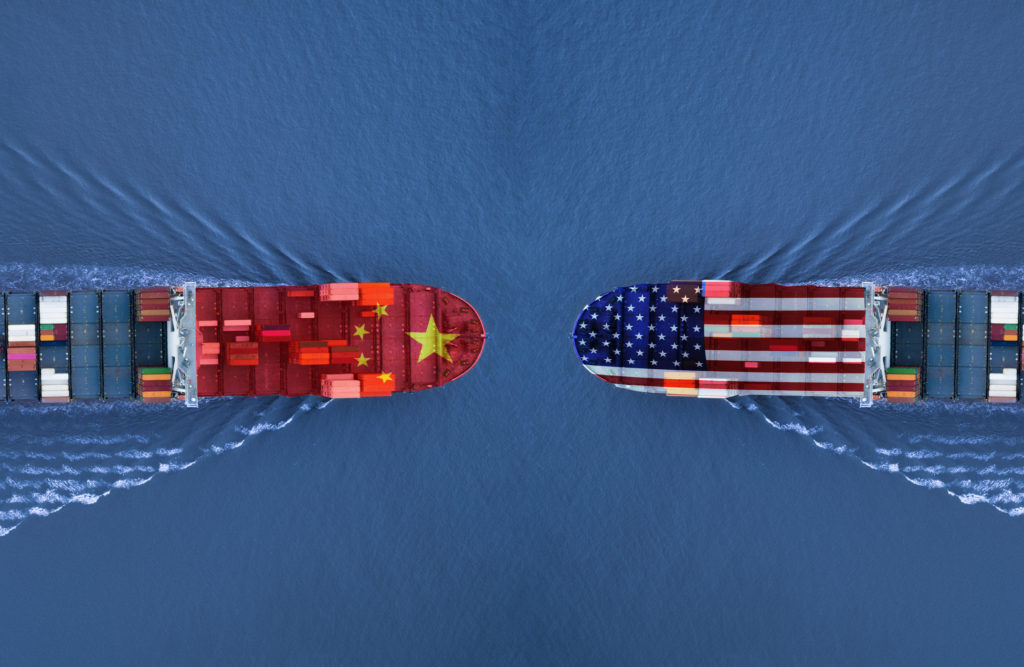
“The first boats carrying Chinese goods with 145% tariffs are arriving in LA. They’re half-full. Expect shortages soon,” CNN, May 6
“Chinese holiday spending inches up but trade war weighs on services,” Reuters, May 6
“China’s Financial Officials to Hold Briefing Amid Tariff Threat,” Bloomberg, May 6
“S&P 500 on track for the longest winning streak in 20 years as Trump and China show some willingness to bend on trade” CNN, May 2
“China’s top diplomat backs Iran’s nuclear diplomacy ahead of US talks,” Reuters, May 1
“BRICS foreign ministers tout multilateralism amid economic turmoil from US trade policies,” The South China Morning Post, April 29
“Exclusive: China’s Xi to visit Shanghai in show of strength amid trade war,” Reuters, April 28
The Ripple Effect of Trump’s Reciprocal Tariffs
Hosted by ICAS and World Salon
May 6, 2025
11:00 AM – 12:30 PM EST
On May 6, the Institute for China-America Studies (ICAS) and World Salon jointly launched the first Digital Fireside Series. This first panel discussion included panelists from the United States, Mexico, and Canada to jointly discuss the ripple effect of President Trump’s fresh round of tariffs aimed at reshaping international trade relationships, particularly with North American partners and trans-Pacific trade relationships. The video recording of the panel discussion will be released soon on the ICAS website.
Community Building & Networking: Exploring the Future of “Chinese Elements” in the U.S. Climate Initiatives
Hosted by ICAS
April 29, 2025
5:30 PM – 7:30 PM EST
The Institute for China-America Studies (ICAS) convened a panel discussion on April 29 as part of DC Climate Week 2025, exploring how public, private, and international actors can find new pathways for cooperation on climate action especially amid growing geopolitical divergence between the United States and China. Drawing on diverse policy, academic, and economic expertise, the conversation focused on how to overcome fragmentation and harness shared interests in areas like energy transition, green technology, and climate finance.
The panel started by emphasizing that China is positioned to lead the next phase of green industrialization because of its top-down management and advantages in infrastructure and efficient energy transmission. These allow China to capture higher returns on climate investment, particularly in renewable energy and clean manufacturing, where the U.S. is still lagging far behind. The U.S. has certain structural strengths in human capital and innovation. For example, the speakers argued that 9 out of 10 top talents in climate-related fields stay in the U.S. Nevertheless, the U.S. lacks the same centralized capability to scale clean energy systems quickly…
Irina Strelnikova on the Arctic: Russia
Interviewed by Nong Hong
Tuesday, April 29, 2025
ICAS conducted its fourth Arctic-focused ICAS Expert Voices Initiative (EVI) interview series with Dr. Irina Strelnikova, Programme co-head of International Relations: European and Asian Studies, Faculty of World Economy and International Affairs, National Research University Higher School of Economics. The discussion focused on Russia’s Arctic policy, its cooperation with third-party countries such as China and India in the Arctic region, and its relationship with Western Arctic states led by the United States.
Halfway There: Tracking the Global Momentum for the BBNJ Treaty
By Nong Hong
April 29, 2025
The adoption of the Agreement on the Conservation and Sustainable Use of Marine Biological Diversity of Areas Beyond National Jurisdiction (BBNJ) in June 2023 marked a historic milestone in international ocean governance. Often referred to as the “High Seas Treaty,” the BBNJ Agreement fills a critical legal gap in the governance of the vast ocean spaces that lie outside national jurisdictions. It offers a framework for protecting biodiversity by introducing measures such as area-based management tools—including the establishment of marine protected areas (MPAs)—regulating access to marine genetic resources (MGRs), conducting environmental impact assessments (EIAs), and ensuring equitable benefit-sharing. Yet, while the adoption was momentous, the treaty’s effectiveness hinges on ratification. Sixty countries must ratify the treaty for it to enter into force, and as of April 2025, just 21 have completed this process.
Trump’s Shipbuilding Ambition Risks Backfiring on His Big Deal
By Yilun Zhang
April 28, 2025
The Trump administration’s renewed pressure on China’s shipbuilding and maritime shipping industries offers yet another vivid testament to its enduring commitment to U.S.–China competition. These latest initiatives—confusing port fee policies with heightened national security rhetoric—reveal a trajectory where geopolitical anxieties have eclipsed economic pragmatism. Given the administration’s historical grievances toward globalization, its enthusiasm to compete with China, and its willingness to destabilize norms, such a strategy is unsurprising. Yet by heavily securitizing a once-commercial rivalry, President Trump not only unsettles the international order but also erodes the fragile foundations of U.S.–China relations. At a moment when tariffs had already driven ties to a new historic low, turning shipbuilding into a security flashpoint ensures that meaningful dialogue remains a distant prospect.
On Sunday, May 4, 2025, Senior Fellow Sourabh Gupta was interviewed by CGTN The World Today on the decline in the U.S. international image since the initiation of President Trump’s trade wars.
On Sunday, May 4, 2025, Senior Fellow Sourabh Gupta was quoted by Global Times on the effects of the high tit-for-tat US-China tariffs on producers and consumers.
On Thursday, May 1, 2025, Senior Fellow Sourabh Gupta was interviewed by CGTN The Point on the on-going trade war at the 100-day mark of the Trump presidency.

The Institute for China-America Studies is an independent nonprofit, nonpartisan research organization dedicated to strengthening the understanding of U.S.-China relations through expert analysis and practical policy solutions.
1919 M St. NW Suite 310,
Washington, DC 20036
icas@chinaus-icas.org
(202) 968-0595
© 2025 INSTITUTE FOR CHINA-AMERICA STUDIES. ALL RIGHTS RESERVED.